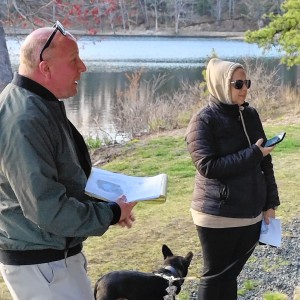Lake Ellis weed control plan approved
| Published: 05-04-2023 3:12 PM |
ATHOL – Emily Vulgamore, biology project manager for Solitude Lake Management, told the Conservation Commission on Tuesday that a survey of Lake Ellis found more aquatic weeds than is normal at this time of year.
“What we found was substantial Variable Milfoil growth,” she said. “To be honest, it was at the state that we would have expected to see during the summer.”
Vulgamore said that the density of the weeds is such that it can be seen on the water’s surface.
“Variable Milfoil is a huge problem at Lake Ellis,” she said. “I’ve never seen (it) this developed this early on in the season.”
Solitude is proposing a ‘whole lake’ treatment with the aquatic herbicide Sonar. While two treatments will be required in May and June, a third may be needed in July.
“This treatment will target the Variable Milfoil, in addition to the Fanwort,” Vulgamore explained. “Now, we didn’t see Fanwort, but wouldn’t expect to; it’s a little too early in the season. But our treatment program is designed to target both Fanwort and Variable Milfoil.”
According to the state Department of Conservation and Recreation, Variable Milfoil and Fanwort are highly competitive plants capable of rapid growth and spread. They can displace native species, reduce biodiversity, limit recreational uses and decrease water quality.
As for aquatic plants that are native to the lake, Vulgamore said it’s expected that they will see a full recovery by next season. Athol Conservation Agent Ward Smith asked Vulgamore if the region’s mild winter had anything to do with the increase of Milfoil at the lake.
Article continues after...
Yesterday's Most Read Articles
 Plan calls for upgrades to Silver Lake in Athol
Plan calls for upgrades to Silver Lake in Athol
 Magic comes to Red Apple in Phillipston
Magic comes to Red Apple in Phillipston
 Parents question handling of threat at Erving Elementary School
Parents question handling of threat at Erving Elementary School
 On The Ridge with Joe Judd: What time should you turkey hunt?
On The Ridge with Joe Judd: What time should you turkey hunt?
 Erving rejects trade school’s incomplete proposal for mill reuse
Erving rejects trade school’s incomplete proposal for mill reuse
 Orange man gets 12 to 14 years for child rape
Orange man gets 12 to 14 years for child rape
“It very well could be,” she replied. “It very well could be the mild winter. It could just be that the Milfoil never really (died off) over the winter, so you’re seeing a lot of old growth from the year before, in addition to the new growth.”
Lake Ellis resident Max MacPhee noted that the survey done in late April had originally been scheduled for sometime in May.
“The purpose of the survey was to find out all the all aquatic weeds, yet you say it’s too early to find any Fanwort,” he said. “Yet, you still recommend doing a Sonar treatment to treat Fanwort. What was the purpose of a survey if not finding any Fanwort does not alter your recommendation to treat for Fanwort?”
Vulgamore was confident that there is Fanwort in the system based on observations by the Friends of Lake Ellis and previous surveys. She added that the reason the survey was moved from May to late April was to meet the conditions presented to the Conservation Commission. She said Sonar is most effective in May, after which the efficacy decreases over time.
After a bit more discussion, the Conservation Commission voted unanimously to approve Solitude’s treatment plan for Lake Ellis. The treatments will be paid for out of a $50,000 line item in Athol's FY23 budget. Assistant Public Works Director Paul Raskevitz said the town was informed that once this round of treatments is complete, no treatment will be needed again for four or five years on average.
Greg Vine can be reached at gvineadn@gmail.com.

 Students plant red maple outside Athol Community Elementary School
Students plant red maple outside Athol Community Elementary School Mass Dems propose nine-month shelter stay limit
Mass Dems propose nine-month shelter stay limit Federal probe targets UMass response to anti-Arab incidents
Federal probe targets UMass response to anti-Arab incidents Sportsman’s Corner: Missouri gobbler
Sportsman’s Corner: Missouri gobbler